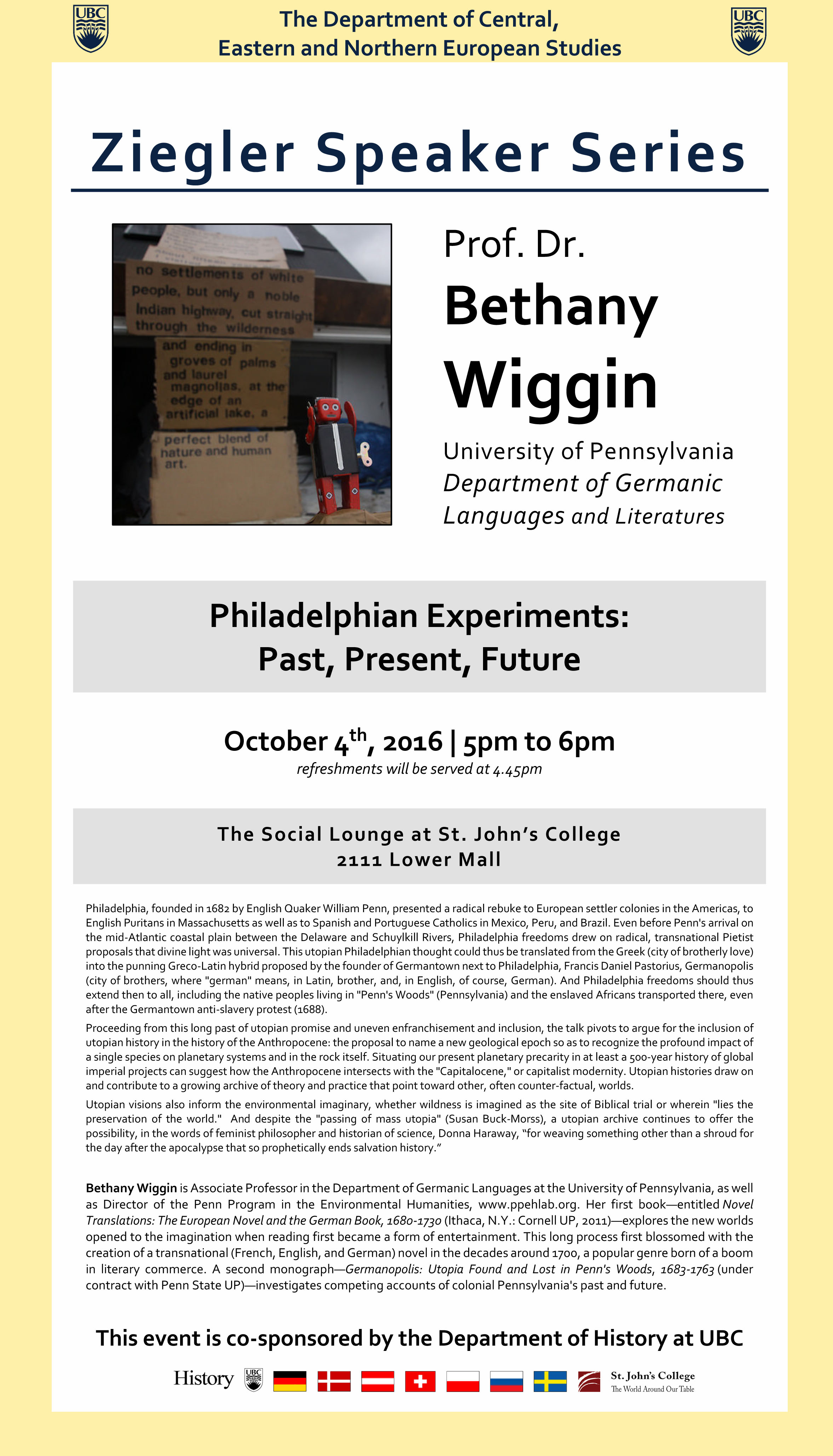Ziegler Lecture Series:
Dr. Bethany Wiggin, University of Pennsylvania, Director of the Penn Program in Environmental Humanities, will speak on “Philadelphian Experiments: Past, Present, Future” on October 4, 2016 at 5pm.
Abstract
Philadelphia, founded in 1682 by English Quaker William Penn, presented a radical rebuke to European settler colonies in the Americas, to English Puritans in Massachusetts as well as to Spanish and Portuguese Catholics in Mexico, Peru, and Brazil. Even before Penn’s arrival on the mid-Atlantic coastal plain between the Delaware and Schuylkill Rivers, Philadelphia freedoms drew on radical, transnational Pietist proposals that divine light was universal. This utopian Philadelphian thought could thus be translated from the Greek (city of brotherly love) into the punning Greco-Latin hybrid proposed by the founder of Germantown next to Philadelphia, Francis Daniel Pastorius, Germanopolis (city of brothers, where “german” means, in Latin, brother, and, in English, of course, German). And Philadelphia freedoms should thus extend then to all, including the native peoples living in “Penn’s Woods” (Pennsylvania) and the enslaved Africans transported there, even after the Germantown anti-slavery protest (1688).
Proceeding from this long past of utopian promise and uneven enfranchisement and inclusion, the talk pivots to argue for the inclusion of utopian history in the history of the Anthropocene: the proposal to name a new geological epoch so as to recognize the profound impact of a single species on planetary systems and in the rock itself. Situating our present planetary precarity in at least a 500-year history of global imperial projects can suggest how the Anthropocene intersects with the “Capitalocene,” or capitalist modernity. Utopian histories draw on and contribute to a growing archive of theory and practice that point toward other, often counter-factual, worlds.
Utopian visions also inform the environmental imaginary, whether wildness is imagined as the site of Biblical trial or wherein “lies the preservation of the world.” And despite the “passing of mass utopia” (Susan Buck-Morss), a utopian archive continues to offer the possibility, in the words of feminist philosopher and historian of science, Donna Haraway, “for weaving something other than a shroud for the day after the apocalypse that so prophetically ends salvation history.”
Bethany Wiggin is Associate Professor in the Department of Germanic Languages at the University of Pennsylvania, as well as Director of the Penn Program in the Environmental Humanities,www.ppehlab.org<http://www.ppehlab.org>
Her first book—entitled Novel Translations: The European Novel and the German Book, 1680-1730 (Ithaca, N.Y.: Cornell UP, 2011)—explores the new worlds opened to the imagination when reading first became a form of entertainment. This long process first blossomed with the creation of a transnational (French, English, and German) novel in the decades around 1700, a popular genre born of a boom in literary commerce. A second monograph—Germanopolis: Utopia Found and Lost in Penn’s Woods, 1683-1763 (under contract with Penn State UP)—investigates competing accounts of colonial Pennsylvania’s past and future.


CENES gratefully acknowledges support from the Department of History.
